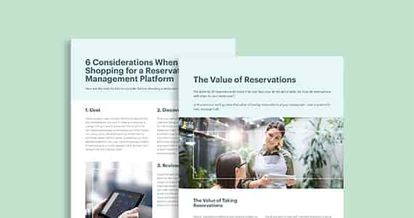City bylaws and zoning: they are often the overlooked siblings when choosing a restaurant location. But when you’re choosing a space for your business, it’s pretty important that you know whether the location you’re salivating over is suitable from a bylaw and zoning perspective.
It’s your responsibility as a business owner to figure out which developments, restrictions, and changes affect your desired location. Your restaurant’s viability depends on it.
Yes, this is complex. No, you won’t have to learn the hard way.
In this section we’ll cover the necessary steps to make sure your business can operate legally. We’ll share the what/where/how of zoning, zoning laws, and zoning permits.
But most importantly, we’ll guide you through the process so that you know how to plan and coordinate all pieces of getting your restaurant up and running without any nasty surprises.
Know the Basics: Restaurant Zoning Laws
Zoning 101
Depending on your city, there are specific areas that can and cannot be used for certain things.
What this means is, the location of your restaurant may be limited by where you can actually have a restaurant in your city. Each municipal government has their own laws that regulate what types of businesses can operate in different districts or zones.
Why?
Your city doesn’t want to negatively impact its residents, and your local government has installed regulations to protect local communities.
These regulations, however, aren’t necessarily set in stone; if the development of a certain property will economically advance the community, laws may be modified or suspended through a zoning permit.
This flexibility is why you’ll need talk to your aderman or councillor about zoning – we’ll tell you more about this shortly.
Zoning laws
Zoning laws are often referred to as “zoning ordinances” or “land use regulations”.
Zoning laws are the municipal regulations that determine whether you can have a restaurant in the zone or neighborhood you’re interested in. These restaurant laws and regulations are written as lengthy legal documents that determine whether a property can be used for residential or commercial purposes. They also regulate lot size, placement, density, height of structure, and procedures for handling infractions, penalties, hearing appeals, and more.
And, in case you’re wondering…
Yes, there are specific restaurant zoning laws.
While there are laws that pertain to commercial businesses in general, there are zoning laws that specifically govern restaurants.
Although some locations may be clearly designated as within commercial zones, many locations are on the edge and require further investigation to know whether a building is properly zoned for a restaurant. These zoning laws will be unclear unless you inquire with the local government, councillor, alderman, or, better yet, determine whether a restaurant was there before.
As mentioned earlier, zoning laws are enacted by cities or counties to restrict a property’s use in residential and commercial areas. These laws are often meant to decrease traffic and congestion to ensure the neighboring residential community is not negatively impacted.
When getting to know your prospective neighborhood, it’s also important to connect with the following entities to get a sense of the potential contribution your restaurant would make to the area:
- Local homeowners’ associations
- Local business improvement associations
- Community land trusts
- Other community groups
These organizations will also be able to tell you which zoning laws may be in place to either protect the residential community and/or support commercial businesses. Moreover, you’ll get a sense of whether the community supports local businesses and restaurants, in addition to establishing a community network.
While it may not be easy to know where to start, we’ve created a step-by-step process so you work through any necessary licenses and permits needed to open a restaurant.
How to Work through Licenses and Permits Needed to Open a Restaurant
Step 1: Determine which zoning laws you should abide by (municipal vs. county).
Depending on where your property is located, you’ll have to evaluate which zoning laws relate to you.
A trick to figuring out which zoning law to follow is to start with the lowest level of government and work your way up.
For example, if a restaurant is located within a city’s limits, the city’s zoning laws override the county’s laws to prevent negative impact on the local residential community.
But that doesn’t mean you only abide by one level – you’ll still need to comply with all licenses and permits needed to open a restaurant. It’s just more efficient to start with the lowest level, because those laws will be most relevant and affect your restaurant the most.
Step 2: Identify your zoning code in your city or town.
Most cities and towns operate by similar zoning categories – commercial, residential, and mixed-use residential & commercial – that determine how the property can be used. Although most jurisdictions have their zoning codes available online, it’s always best to inquire with the municipal or county clerk’s office, the local library, or even a city attorney’s office to find out.
Knowing the exact zoning code of your desired neighborhood will determine whether you can move forward with plans or whether you need to take an additional step. You may need to acquire a zoning permit to modify the use of the property (we will cover zoning permits shortly).
While you may encounter many different codes and regulations, it’s important to know which municipal zoning law impacts you. Zoning codes are different in each city, and you’ll need to know where your restaurant sits.
New York City
The Zoning Resolution: Article III – Commercial District Regulations
Your best bet is to contact your municipal or county clerk’s office to make sure you’re referencing the latest and most accurate zoning code in use.
Chicago
Chicago Zoning Ordinance and Land Use Ordinance
Your best bet is to contact your municipal or county clerk’s office to make sure you’re referencing the latest and most accurate zoning code in use.
Toronto
Zoning By-law 596-2013 (interactive map included)
Your best bet is to contact your municipal or county clerk’s office to make sure you’re referencing the latest and most accurate zoning code in use.
Step 3: Find out if you can have a restaurant in your zone.
Once you know your zoning code, you’ll need to know whether you can open your restaurant there.
Even if you think you understand the zoning code, we recommend calling your municipal planning or building department who executes the zoning laws for your community. The official opinion of municipal staff who can formally advise you will save you time, money, and headaches down the road. Typically, municipal and county planning offices have planners and consultants dedicated to fielding questions about licenses and permits needed to open a restaurant.
Although each municipal and county has many similarities, there are many differences between zoning laws and protocols to navigating each regional scenario.
Chicago
Chicago is divided into zoning districts that abide by different regulations. Each zoning district determines what kind of businesses are permitted to operate within each zone and so they reflect a diversity in business and neighborhood use.
The City of Chicago’s Small Business Center can help you figure out the right district for your restaurant with this information:
- Business activity
- Specific address in the zoning map
- Determine allowed zoning districts
Before a business licence application can be processed, zoning must be approved by the City of Chicago’s zoning review process. In this process they will be determining:
- The proper classification of the activity of your business
- Whether that business activity is allowed in that district
- Compliance with parking, landscape, and building requirements
- Verification of valid driveway permit
To find out how to navigate this with minimal pain, check out the City of Chicago’s Zoning website. They have the following useful tools to help you figure out where you can have a restaurant:
We also recommend confirming the zoning status of your location by calling or making an appointment with a business consultant at the City of Chicago’s Small Business Centre.
New York City
In New York City, restaurants are only allowed to operate within eight commercial districts. Each commercial district is uniquely created to serve the needs of the local community and serves a similar function to each business in the district.
To learn more about commercial districts and where you can have a restaurant, visit the NYC Department of City Planning website.
You can also visit NYC Business’ website dedicated to zoning requirements to view an interactive map that will provide details of any particular building (including use, size, lot lines, parking requirements, etc.)
For more information about a specific building, contact a professional planner at New York City’s Zoning Information Desk at the Department of City Planning.
Toronto
Toronto’s City Council enacted a new Zoning Bylaw on May 8, 2013 (i.e. Zoning Bylaw No. 569-2013) that applies to all new projects that are submitted after that date.
The easiest way to determine whether your restaurant is permitted within a specified location is to apply for the Preliminary Zoning Review Program to review a property’s compliance to zoning bylaws. The Preliminary Project Review (PPR) Use Only assesses whether the property can be used as a restaurant.
To view the City of Toronto’s zoning map and land use charts, see their interactive map. For more information and support, contact Toronto Building who can support you over the phone or in-person.
Step 4: Inquire about liquor licence regulations.
When determining your restaurant neighborhood, you also need to be aware of liquor restrictions and special regulations that may apply to your zoning district.
Across North America, we still have many prohibition-era “dry” ordinances preventing the sale of alcohol in districts, towns, and cities. Many communities, from small town to big cities alike, prohibit the sale of alcohol within a short distance of a church or house of worship.
While there are no cut-and-dry rules, each community will clearly indicate what is and isn’t possible, and it’s good to know the rules in your desired neighborhood.
Chicago
Since the City of Chicago is divided into diverse zoning districts that abide by different regulations, each district has its own rules related to liquor licenses. Between “dry wards” and “liquor moratorium districts” you need to know which license restrictions and regulations may impact your restaurant.
To learn more about liquor license restrictions and regulations affecting your zone, see the City of Chicago’s Business Affairs and Consumer Protection website. Visit Liquor Licenses to learn more about getting a liquor licence, in addition to talking to a consultant who will walk you through the process.
New York City
While there are many dry communities in the State of New York, there currently are no dry districts in New York City. To get a liquor licence, contact the New York State Liquor Authority.
Toronto
Since Toronto hasn’t had any dry neighborhoods since 2000 (i.e., The Junction), you can acquire a liquor licence from the City of Toronto’s Municipal Liquor Licence Clearance.
Step 5: Reach out to your city councillor or alderman.
Find out which city councillor or alderman represents your ward. You’ll need to contact their office to learn more about zoning requirements and changes happening in your proposed location.
Some questions to ask include:
- Are there any new developments going on?
- Are you, or will you, be approving liquor licenses in the area?
- Are there restrictions for particular types of businesses (e.g. bars/nightclubs)?
- How can this restaurant positively impact the community and/or contribute to the communities’ positive economic growth?
Find your Chicago ward and alderman.
Find your New York City ward and councillor.
Find your Toronto ward and councillor.
Now that you’ve done all the research on your desired location and contacted the appropriate municipal experts, it’s time to acquire zoning permits if needed.
Restaurant Zoning Requirements
A zoning permit is the legal permit you get from your municipal government allowing you to modify a property. This includes changing the way you use the property (e.g., from residential to commercial) and/or building additional structures on the property. Restaurant laws and regulations include zoning permits.
Not to be confused with a building permit, a zoning permit is typically the first step in your development plans, followed by the application of a building permit.
While each jurisdiction will have a different process, a zoning permit sometimes comes as a zoning clearance that is given as part of the building permit review. Other times an actual zoning permit is required before you can apply for a building permit. Again, contact your city to find out which scenario is applicable to your restaurant zoning requirements.
Conclusion
We know – investigating restaurant laws and regulations may not be the most fun part of owning a restaurant. But when you gather all of the necessary information about your potential location before you even start shopping, you’ll be able to sleep at night knowing you won’t encounter any nasty surprises – like trying to open a bar in a dry ward.





